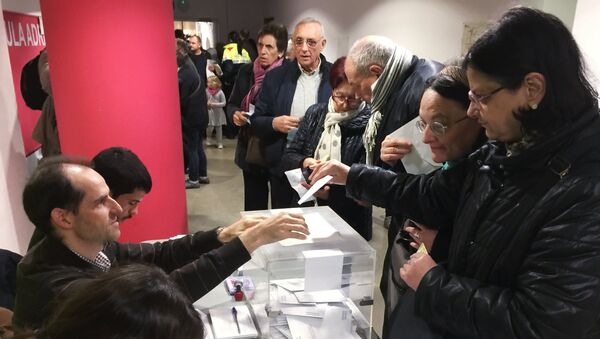The poll did predict that there will be a close tie between the pro-unity Citizens party (Ciutadans de Catalunya), which is expected to get 32-33 seats and 24 percent of the vote, and pro-independence Republican Left of Catalonia (Esquerra Republicana) with 30-32 seats and 21 percent of the vote.
Junts per Catalunya, the party led by former Catalan President Carles Puigdemont, is set to gain 27-29 seats in the election and 19 percent of the vote. This is 20 percent less than the party had gained in the 2015 election, where it came out with 62 seats.
Catalan parliamentary candidate believes snap election illegal https://t.co/3NK1L2H2fQ #Catalonia #Spain pic.twitter.com/AE1uKJxmNQ
— Sputnik (@SputnikInt) 21 декабря 2017 г.
Puigdemont went into self-exile in Brussels with four other former Catalan government ministers after the Spanish national court charged him with sedition, rebellion, and misuse of public funds over the referendum. He has expressed his desire to return to Catalonia if pro-independence parties are successful in the election and held a rally for supporters in Catalonia via live broadcast from Belgium.
READ MORE: Poll: Over 60% of Spaniards Seek Constitutional Amendments Amid Catalonia Crisis
Eight other former ministers have been jailed by a Spanish judge on the same charges, and 20 were called before the court in November. While six politicians were released on bail in early December, Oriol Junqueras, the deposed vice president of the Catalan government and leader of the Republican Left of Catalonia, has been campaigning for the election from behind bars in Madrid.
“If separatist parties win in parliamentarians — but not in votes — the new government will be fragile and the autonomous block we have — 155 article of Constitution — will remain, so we will have new election minimum in six months,” Fuente told Sputnik.
Thursday's election was triggered by the Spanish government’s use of Article 155 on October 27, after the Catalan government adopted a resolution on the region’s independence from Spain. This article of Spain’s Constitution was implemented by the central government and meant Madrid could remove the leaders of Catalonia’s government, take control of the region’s administration and call for new elections.
On October 1, over 90 percent of the more than 2.2 million Catalans who participated in a regional referendum supported secession from Spain. The referendum was declared illegal by Spain’s constitutional court. Fuente remarked that the election on Thursday would be another type of independence referendum.
“The popular feeling is that election is another kind of 'legal referendum' between Yes and No forces,” Fuente said.
Catalonia had previously held an informal self-determination referendum in 2014, in which 80 percent of voters backed independence.


